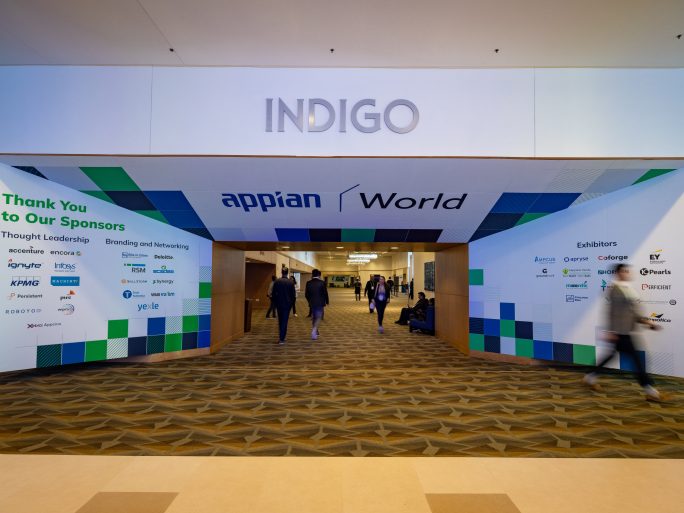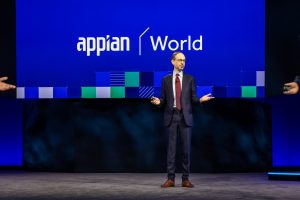Process Automation Will Become Smarter (and More Private)

Appian focuses on privacy when integrating artificial intelligence into its platform: Who wins with today’s AI models?
At Appian World 2023 in San Diego, US, Appian reviewed the key new features of an increasingly comprehensive platform for end-to-end process automation.
Among the new capabilities is Appian Data Fabric, a “virtual database” (as the company’s CEO Matt Calkins calls it), announced at the end of last year and which is being very well received by the companies that make use of this platform. Not surprisingly, it has already been adopted by 94% of Appian’s new customers, as the executive himself stated.

On this occasion, we will focus on the second major theme of the congress, artificial intelligence. Increasingly present in the technologies used by organisations, AI is also generating a controversial debate, which Calkins wanted to talk about during his speech and also during the interview with the chronicler who writes these lines.
Public AI vs. private AI
In this brutal adoption of artificial intelligence that we have been experiencing in recent years, there is an aspect that is not usually discussed but which Calkins brought into focus: both when it comes to training AI models and obtaining results, companies are handing over their data to third party companies, those that process the information to return solutions proposed by artificial intelligence. It is true that these companies extract a great deal of value from this, but it is also true that AI providers can keep this information to feed the algorithms and make them more and more efficient.
The question Calkins asked himself is who is the big beneficiary in these processes: “There are a lot of people using AI algorithms like ChatGPT. They think it’s an amazing technology and they don’t mind giving their data to an organisation like Microsoft so that this architecture can ‘work its magic’ and give them valuable information. But there are also privacy issues here, even regulatory issues, because these companies are handing over data that they don’t know where it will end up.
![]()
Indeed, that information is likely to end up feeding AI algorithms to improve results, but because it is stored it could also be used for other purposes beyond the control of its owners.
In this sense, Calkins added that companies that make use of these public AI algorithms are losing their competitive advantage: “They are using artificial intelligence that is being trained on their own data, which is probably being sold to competitors. In practice, this data is training the competition, so it loses its value and privacy goes out the window”.
This is where Appian’s CEO introduces the concept of private AI, which aims to comply with privacy regulations and, above all, be based on AI training that is fit for purpose for each company, not for generic purposes.
“Appian supports private AI so that companies have their own algorithms trained on internal data. This way, no organisational information is disclosed and they only benefit that organisation, not third party companies,” Calkins explained.
![]()
The future of AI, in his view, lies in training on private data. “Companies will be able to use basic, open source artificial intelligence to be trained on their own data, so that it is customised to their real needs. There are many reasons why companies use their own customised business applications. And with artificial intelligence it will be exactly the same – it will be personalised.
This commitment to private AI is part of Appian’s strategy to incorporate artificial intelligence into its platform.
Calkins gave an example: “Let’s say you have a specific form that your customers fill out on a regular basis. You’ve seen a million of those forms, so the idea is to train your AI with those million forms to be very good at extracting data and understanding and valuing all that information”.
Low-code AI
Appian doesn’t just want to stick to training artificial intelligence based on the internal data of the companies that use it but intends to go further by injecting low-code into those design and training processes. The goal is, once again, to democratise the use of corporate data to automate them through easy-to-use and easy-to-implement artificial intelligence algorithms.
The process management software provider specialises in low-code, and now wants to make use of these technologies to develop automated processes based on artificial intelligence algorithms in a simple way, without the need to write lines of code or have advanced knowledge in this area.
The first step was presented at the congress: Appian AI Skill Designer and the integration of generative AI for process automation.
“The potential benefits of artificial intelligence for process automation are immense, but only if organisations can successfully incorporate complex AI technologies into their digital workflows. Appian AI Skill Designer and our OpenAI integration are breakthroughs that democratise access to the benefits of AI,” Calkins announced during his keynote at Appian World 2023.
![]()
Appian has worked to ensure that GPT-based natural language processing (NLP) understands how to create automations with the Appian platform. Using OpenAI integration, Appian is developing several AI-backed generative capabilities to augment automation with an emphasis on improving developer productivity in day-to-day activities. These include:
* Using generative AI and natural language to automatically create digital forms from an existing form with natural language instructions. For example, taking an existing document, such as a business licence application, and applying generative AI to build a secure digital form that can be used to instantly digitise a business in Appian.
* Using generative AI to understand how complex applications work. By examining the design of a software application, generative AI can analyse the design to provide natural language descriptions of how an application works, providing benefits such as self-generating software documentation.
* Connecting Generative AI with Appian’s Data Fabric. Appian’s Data Fabric technology connects enterprise data into a single, secure virtual data model. With a connection between generative AI and Data Fabric, users can ask questions about their enterprise data in natural language. For example, a user can ask: “Which customers are at risk of losing customers in the next 30 days?”. Generative AI can provide recommendations and insights that drive proactive action on the Appian platform.
Calkins ended the interview with the writer bluntly: “My prediction is that private AI is going to win. That’s going to be the dominant usage model for AI, which is very different from what people are predicting today. The common mindset is that AI is going to be public and it’s going to entrench the leading vendors, which will allow them to profit enormously from it. I would argue that there are good reasons why that’s not true.